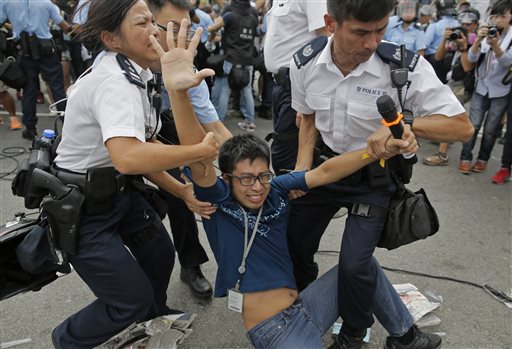HONG KONG (AP) — The crowds of pro-democracy protesters on the streets of Hong Kong dwindled sharply Friday after the territory’s leader agreed to meet with their leaders over their demands for electoral reforms. An afternoon thunderstorm — and sheer exhaustion after the weeklong protests — also appeared to keep people off the streets.
Protesters and police scuffled briefly Friday morning as officers forced demonstrators back to clear a path for an ambulance leaving the sprawling government compound, the focal point of the protests. The complex remained closed because mostly student protesters had blocked entrances, keeping civil servants from getting inside.
In other areas, police removed barricades as people returned to work and school after a two-day holiday.
It was unclear if the shrinking crowds signaled fading momentum for the protest movement — the biggest challenge to Beijing’s authority since China took control of the former British colony in 1997 –or if it was a temporary lull before renewed demonstrations this weekend.
Also unclear was what kind of compromise the talks with Hong Kong Chief Executive Leung Chun-ying — whose resignation the protesters have demanded — might achieve.
Protesters have been pushing for the Chinese government to reverse its recent decision requiring a mostly pro-Beijing panel screen all candidates for Hong Kong’s first election to choose the territory’s leader in 2017. The demonstrators want open nominations.
“What we want to fight for is our freedom, and the free nomination of candidates for our chief executive,” said Ivy Chan, a 25-year-old social worker.
A front-page editorial Friday in the People’s Daily newspaper, published by China’s ruling Communist Party, underlined the leadership’s unwillingness to negotiate changes to its August decision.
Student protesters had threatened to surround or occupy government buildings if Leung did not step down by Thursday, and police had warned of serious consequences if they did that.
Just minutes before Thursday’s midnight deadline set by protesters, Leung held a news conference to offer the talks, but said “I will not resign.”
Standing beside Leung was the territory’s top civil servant, Chief Secretary Carrie Lam, and he asked her to arrange the talks. She said she would seek to meet with leaders of the demonstrations as soon as possible.
“I hope both sides will be satisfied,” she said. “Students had wanted a public meeting but I hope that we can have some flexibility to discuss details.”
The Hong Kong Federation of Students said in a statement early Friday that they planned to join the talks with the government, focused specifically on political reforms. They reiterated that Leung step down, saying he “had lost his integrity.”
One of the leaders of the broader Occupy Central democracy group, which started a long-threatened plan to paralyze the city’s downtown core by joining the student demonstration, also welcomed the talks.
“This could be an opportunity to solve the plight we are facing,” said Benny Tai.
Earlier Friday, protesters stopped two vans from delivering breakfast and medical supplies to the hundreds of police guarding the government complex.
“The protesters have occupied roads, obstructed the entrances and exits of government buildings, stopped police officers from changing shifts and denied them food and water supply. These are serious illegal acts and are unreasonable and inhumane actions,” the government said in a statement.
China’s government has been largely silent on the protests, other than to call them illegal and support the Hong Kong government’s efforts to disperse them. However, the People’s Daily has published lengthy commentaries on the protests.
On Friday, it said a small group of protesters were attempting “hijack” the system and force changes to the electoral rules to benefit a minority of people. “The core of their efforts to gain so-called universal suffrage is to ensure that their representatives, including those who confront the central government, can become candidates for chief executive.”
It said this effort was doomed to failure, and that there was “no room for concessions” on the candidate screening issue. It reminded that Hong Kong “is directly under the jurisdiction of the central government; it is not a country or an independent political entity.”
When negotiating the handover of Hong Kong from Britain, China’s ruling Communist leaders agreed to a “one country, two systems” that would preserve Western-style civil liberties and broad autonomy, while promising eventual democracy. Protesters say China is reneging on a promise that the city’s top leader will be chosen through “universal suffrage.”
Leung said the authorities would continue to tolerate the protests as long as participants did not charge police lines, but urged them to stop their occupation of much of the downtown area.
“I urge students not to charge into or occupy government buildings. … It’s not about my personal inconvenience,” he said. “These few days the protesters’ occupation of key areas of the city has already seriously affected Hong Kong’s economy, people’s daily lives and government functioning.”
___
Associated Press writers Louise Watt, Wendy Tang, Joanna Chiu and Elaine Kurtenbach contributed to this report.

COMMENTS
Please let us know if you're having issues with commenting.